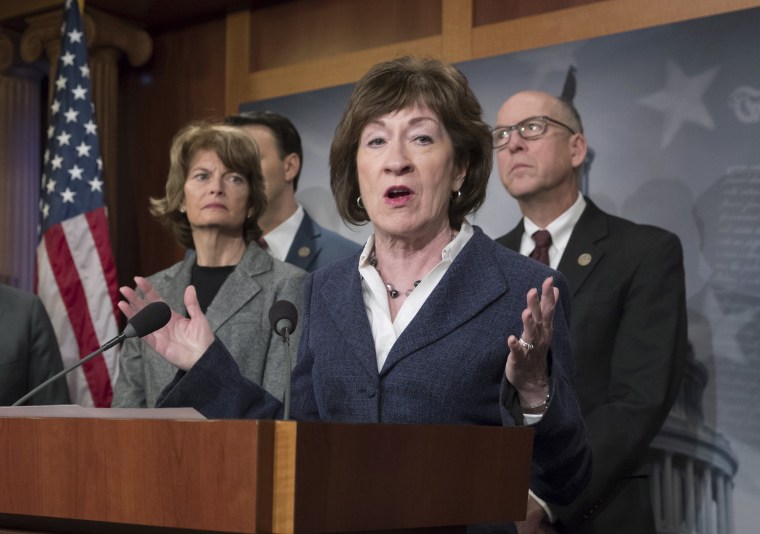WASHINGTON — Within hours of Wednesday's surprising retirement announcement from Supreme Court Justice Anthony Kennedy, two moderate Republican women in the Senate became an important focus of Democrats seeking to prevent President Donald Trump from appointing a new justice who could reshape the court for decades to come — or at least temper how far right it might bend.
With little power to defeat a nominee outright on their own, Democrats began to look at Sens. Susan Collins of Maine and Lisa Murkowski of Alaska as potential allies in their cause.
Both are moderates who support abortion rights and they are likely to face growing pressure should Trump put forward a conservative nominee who might threaten to severely curb those rights. Senate Democrats are happy to lead that charge.
"People from all across America should realize that their rights and opportunities are threatened," Senate Minority Leader Chuck Schumer, D-N.Y., said on the Senate floor Thursday. "Nothing less than the fate of our health care system, reproductive rights for women and countless other protections for middle-class Americans are at stake."
The pressure is expected to be more intense now than it was during the confirmation of Justice Neil Gorsuch last year, whom both Collins and Murkowski voted for.
Since then, both GOP senators have bucked their party on critical issues, including on repealing the Affordable Care Act. And because Kennedy was considered the swing vote on many hot-button issues, including cases related to Roe v. Wade, his replacement will alter the balance of the high court.
Just two hours after Kennedy’s retirement announcement, Collins reiterated her stance, saying that recognizing the precedent of Roe v. Wade, the 1973 law that legalized abortion, remains an important qualification for any nominee.
“I view Roe v. Wade as being settled law, it's clearly precedent and I always look for judges who respect precedent,” Collins told reporters Wednesday. “When I evaluate judges, I always look at judicial temperament, qualifications, experience, the ABA rating and their respect for the rule of law and the Constitution. Those are exactly the same criteria that I will apply to whomever the president nominates.”
And Murkowski released a statement saying her standards for a Supreme Court nominee are "extremely high."
"It is my longstanding practice to carefully scrutinize the qualifications of judicial nominees and to cast an independent vote when judicial nominations come before the Senate," Murkowski added.
Trump said during the campaign that he would nominate justices who would overturn Roe v. Wade, but during his Senate confirmation hearing, Gorsuch characterized Roe v. Wade as “the law of the land.”
Collins said that after meeting with him extensively during his confirmation process, Gorsuch told her that a good judge "presumes that the precedent is correct." Murkowski said that she decided to vote for him after “much reflection.”
But Gorsuch’s confirmation didn’t shift the balance of the court. Kennedy was often the deciding judge in 5-4 decisions and his decisions were often unpredictable.
Senate expert and American Enterprise Institute scholar Norman Ornstein called it a "litmus test" moment for the two senators.
Democrats have little ability to block Trump’s nominee after Senate Majority Leader Mitch McConnell last year changed the Senate rules for a Supreme Court nominee to pass to a simple majority instead of 60 votes.
With Sen. John McCain, R-Ariz., out for cancer treatment, Republicans have a narrow 50-49 advantage, meaning Democrats would need all of their members and one GOP vote to sink a nominee. That could be a tough task, depending on the nominee, considering that three Democrats voted for Gorsuch and several of them face tough re-election fights in states Trump won by large margins.
In addition to abortion, Democrats also plan to home in on health care in any fight against the nominee, a senior Democratic aide said, as the court is expected to take up cases pertaining to access to health care and the Affordable Care Act. Both Collins and Murkowski were decisive votes in sinking the Republicans’ attempt to repeal Obamacare last year.
“The Senate should reject, on a bipartisan basis, any justice who would overturn Roe v. Wade or undermine key health care protections,” Schumer said on the Senate floor.
The focus on these two issues has another potential benefit for Democrats in an election year — as an appeal to women voters. McConnell wants to hold a vote before the midterm elections in November. If Trump nominates someone who is seen as a threat to overturn abortion rights and roll back health care access, Democrats believe they can further motivate women to vote for their candidates in November, according to a Democratic aide.
"This is going to be brutal," Sen. John Kennedy, R-La., told MSNBC of the coming battle over a nominee. "I would prefer to have a rational discussion, but we don’t live in la la land."

